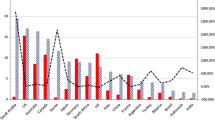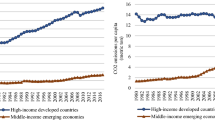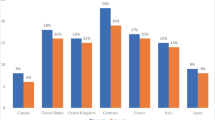Abstract
An extensive number of studies uses trade-to-GDP as a proxy for globalisation in environmental research. Globalisation encompasses much more than just trade in goods. Globalisation is the integration of various countries and includes spillovers of ideas and technology, financial flows, the worldwide movement of labour, and national governments meeting on an international level in a bid to solve social and political problems. This study considers the effect of globalisation on carbon dioxide emissions by using a more flexible and comprehensive measure based on the KOF globalisation index for a panel of 21 OECD nations covering the period 1970–2014. Since the globalisation process is not uniform across countries and time, we use a fully-fledged nonparametric technique to estimate the time-varying coefficient and trend functions. Our results show that the effect of globalization on CO2 emissions is positive up until 2000, then switches to turns negative thereafter.





Similar content being viewed by others
Notes
It should be noted that the kernel-based local linear regression employed in this paper only partially addresses the issue of cross-sectional dependence (CSD) by filtering out the unobserved cross-sectional factors through the inclusion of country-specific trends.
We also provide a plot of the trends of the control variables in Fig. A1 of the Appendix.
Data on imports and exports (as a % of GDP) are obtained from WDI database.
We would like to thank an anonymous reviewer for suggesting this.
Available at http://www.globalcarbonatlas.org/en/CO2-emissions.
References
Acheampong AO (2018) Economic growth, CO2 emissions and energy consumption: what causes what and where? Energy Econ 74:677–692
Acheampong AO, Adams S, Boateng E (2019) Do globalization and renewable energy contribute to carbon emissions mitigation in Sub-Saharan Africa? Sci Total Environ 677:436–446
Adams S, Nsiah C (2019) Reducing carbon dioxide emissions; Does renewable energy matter? Sci Total Environ 693:133288
Awaworyi Churchill S, Inekwe J, Ivanovski K, Smyth R (2018) The Environmental Kuznets Curve in the OECD: 1870–2014. Energy Econ 75:389–399
Awaworyi Churchill S, Ivanovski K, Munyanyi ME (2021) Income inequality and renewable energy consumption: time-varying non-parametric evidence. J Clean Prod 126306
Bai J, Ng S (2004) A PANIC attack on unit roots and cointegration. Econometrica 72(4):1127–1177
Baldwin RE, Martin P (1999) Two waves of globalisation: superficial similarities, fundamental differences (0898–2937)
Banerjee A, Carrion-i-Silvestre JL (2015) Cointegration in panel data with structural breaks and cross-section dependence. J Appl Econom 30(1):1–23
Bu M, Lin CT, Zhang B (2016) Globalization and climate change: new empirical panel data evidence. J Econ Surv 30(3):577–595
Carrion-i-Silvestre JL, Barrio-Castro D, López-Bazo E (2005) Breaking the panels: an application to the GDP per capita. Econom J 8(2):159–175
Chen J, Gao J, Li D (2012) Semiparametric trending panel data models with cross-sectional dependence. J Econom 171(1):71–85
Chen S, Saud S, Bano S, Haseeb A (2019) The nexus between financial development, globalization, and environmental degradation: fresh evidence from Central and Eastern European Countries. Environ Sci Pollut Res 26(24):24733–24747
Chudik A, Pesaran H (2015) Common correlated effects estimation of heterogeneous dynamic panel data models with weakly exogenous regressors. J Econom 188(2):393–420
Churchill SA, Inekwe J, Ivanovski K (2021) R&D expenditure and energy consumption in OECD nations. Energy Econ 105376
Destek MA (2020) Investigation on the role of economic, social, and political globalization on environment: evidence from CEECs. Environ Sci Pollut Res 27(27):33601–33614
Dietz T, Rosa EA (1997) Effects of population and affluence on CO2 emissions. Proc Natl Acad Sci 94(1):175–179
Dreher A (2006) Does globalization affect growth? Evidence from a new index of globalization. Appl Econ 38(10):1091–1110
Dreher A, Gaston N, Martens P (2008) Measuring globalisation. Gauging its consequences. Springer, New York
Edwards L (2001) Trade and the structure of South African production, 1984–97. Dev South Afr 18(4):471–491
Gozgor G, Mahalik MK, Demir E, Padhan H (2020) The impact of economic globalization on renewable energy in the OECD countries. Energy Policy 139:111365
Grossman GM, Krueger AB (1991) Environmental Impacts of a North American Free Trade Agreement. NBER Working Paper (w3914)
Gurgul H, Lach Ł (2014) Globalization and economic growth: evidence from two decades of transition in CEE. Econ Model 36:99–107
Hailemariam A, Smyth R, Zhang X (2019) Oil prices and economic policy uncertainty: evidence from a nonparametric panel data model. Energy Econ 83:40–51
Hanif I, Aziz B, Chaudhry IS (2019) Carbon emissions across the spectrum of renewable and nonrenewable energy use in developing economies of Asia. Renew Energy 143:586–595
Henderson DJ, Parmeter CF (2015) Applied nonparametric econometrics. Cambridge University Press, Cambridge
Henderson DJ, Papageorgiou C, Parmeter CF (2013) Who benefits from financial development? New methods, new evidence. Eur Econ Rev 63:47–67
Ivanovski K, Hailemariam A, Smyth R (2020) The effect of renewable and non-renewable energy consumption on economic growth: non-parametric evidence. J Clean Prod 124956
Keller W, Yeaple SR (2009) Multinational enterprises, international trade, and productivity growth: firm-level evidence from the United States. Rev Econ Stat 91(4):821–831
Khan MK, Teng J-Z, Khan MI, Khan MO (2019) Impact of globalization, economic factors and energy consumption on CO2 emissions in Pakistan. Sci Total Environ 688:424–436
Khan Z, Ali S, Umar M, Kirikkaleli D, Jiao Z (2020) Consumption-based carbon emissions and international trade in G7 countries: the role of environmental innovation and renewable energy. Sci Total Environ 730:138945
Kitamori K, Manders T, Dellink R, Tabeau A (2012) OECD environmental outlook to 2050: the consequences of inaction (9264122168)
Li D, Chen J, Gao J (2011) Non-parametric time-varying coefficient panel data models with fixed effects. Econom J 14(3):387–408
Liddle B (2015) What are the carbon emissions elasticities for income and population? Bridging STIRPAT and EKC via robust heterogeneous panel estimates. Glob Environ Chang 31:62–73
Liddle B (2018a) Consumption-based accounting and the trade-carbon emissions nexus. Energy Econ 69:71–78
Liddle B (2018b) Consumption-based accounting and the trade-carbon emissions nexus in Asia: a heterogeneous, common factor panel analysis. Sustainability 10(10):3627
Liddle B, Smyth R, Zhang X (2020) Time-varying income and price elasticities for energy demand: evidence from a middle-income panel. Energy Econ 86:104681
Lin S, Wang S, Marinova D, Zhao D, Hong J (2017) Impacts of urbanization and real economic development on CO2 emissions in non-high income countries: empirical research based on the extended STIRPAT model. J Clean Prod 166:952–966
Liu B, Wang D, Xu Y, Liu C, Luther M (2018) A multi-regional input–output analysis of energy embodied in international trade of construction goods and services. J Clean Prod 201:439–451
Liu C, Jiang Y, Xie R (2019) Does income inequality facilitate carbon emission reduction in the US? J Clean Prod 217:380–387
Liu M, Ren X, Cheng C, Wang Z (2020) The role of globalization in CO2 emissions: a semi-parametric panel data analysis for G7. Sci Total Environ 718:137379
Lv Z, Xu T (2018) Is economic globalization good or bad for the environmental quality? New evidence from dynamic heterogeneous panel models. Technol Forecast Soc Chang 137:340–343
Ng S, Perron P (2001) Lag length selection and the construction of unit root tests with good size and power. Econometrica 69(6):1519–1554
Pachauri RK, Allen MR, Barros VR, Broome J, Cramer W, Christ R, van Ypserle JP (2014) Climate change 2014: synthesis report. Contribution of Working Groups I, II and III to the fifth assessment report of the Intergovernmental Panel on Climate Change (p. 151). IPCC
Pesaran H (2007) A simple panel unit root test in the presence of cross-section dependence. J Appl Economet 22(2):265–312
Pesaran MH (2015) Testing weak cross-sectional dependence in large panels. Econom Rev 34(6–10):1089–1117
Rafiq S, Salim R, Apergis N (2016) Agriculture, trade openness and emissions: an empirical analysis and policy options. Aust J Agric Resour Econ 60(3):348–365
Rahman MM (2020) Environmental degradation: the role of electricity consumption, economic growth and globalisation. J Environ Manag 253:109742
Ravallion M (2003) The debate on globalization, poverty and inequality: why measurement matters. Int Aff 79(4):739–753
Sadorsky P (2014) The effect of urbanization on CO2 emissions in emerging economies. Energy Econ 41:147–153
Saint Akadiri S, Alola AA, Akadiri AC (2019) The role of globalization, real income, tourism in environmental sustainability target. Evidence from Turkey. Sci Total Environ 687:423–432
Shafik N (1994) Economic development and environmental quality: an econometric analysis. Oxford Econ Pap 46:757–773
Shahbaz M, Sinha A (2019) Environmental Kuznets curve for CO2 emissions: a literature survey. J Econ Stud 46:106
Shahbaz M, Nasreen S, Abbas F, Anis O (2015) Does foreign direct investment impede environmental quality in high-, middle-, and low-income countries? Energy Econ 51:275–287
Shahbaz M, Mahalik MK, Shah SH, Sato JR (2016a) Time-varying analysis of CO2 emissions, energy consumption, and economic growth nexus: statistical experience in next 11 countries. Energy Policy 98:33–48
Shahbaz M, Solarin SA, Ozturk I (2016b) Environmental Kuznets curve hypothesis and the role of globalization in selected African countries. Ecol Ind 67:623–636
Shahbaz M, Nasreen S, Ahmed K, Hammoudeh S (2017) Trade openness–carbon emissions nexus: the importance of turning points of trade openness for country panels. Energy Econ 61:221–232
Shahbaz M, Lahiani A, Abosedra S, Hammoudeh S (2018) The role of globalization in energy consumption: a quantile cointegrating regression approach. Energy Econ 71:161–170
Solarin SA, Al-Mulali U, Sahu PK (2017) Globalisation and its effect on pollution in Malaysia: the role of Trans-Pacific Partnership (TPP) agreement. Environ Sci Pollut Res 24(29):23096–23113
Su L, Ullah A (2008) Local polynomial estimation of nonparametric simultaneous equations models. J Econ 144(1):193–218
Verdolini E, Galeotti M (2011) At home and abroad: an empirical analysis of innovation and diffusion in energy technologies. J Environ Econ Manag 61(2):119–134
Westerlund J, Edgerton DL (2008) A simple test for cointegration in dependent panels with structural breaks. Oxford Bull Econ Stat 70(5):665–704
Wu F, Fan L, Zhou P, Zhou D (2012) Industrial energy efficiency with CO2 emissions in China: a nonparametric analysis. Energy Policy 49:164–172
Yao Y, Ivanovski K, Inekwe J, Smyth R (2019) Human capital and energy consumption: Evidence from OECD countries. Energy Econ 84:104534
You W, Lv Z (2018) Spillover effects of economic globalization on CO2 emissions: a spatial panel approach. Energy Econ 73:248–257
Zafar MW, Saud S, Hou F (2019) The impact of globalization and financial development on environmental quality: evidence from selected countries in the Organization for Economic Co-operation and Development (OECD). Environ Sci Pollut Res 26(13):13246–13262
Zaidi SAH, Zafar MW, Shahbaz M, Hou F (2019) Dynamic linkages between globalization, financial development and carbon emissions: evidence from Asia Pacific Economic Cooperation countries. J Clean Prod 228:533–543
Zhang Y, Su L, Phillips PC (2012) Testing for common trends in semi-parametric panel data models with fixed effects. Econom J 15(1):56–100
Author information
Authors and Affiliations
Corresponding author
Ethics declarations
Conflict of interest
The authors declare no conflict of interest.
Additional information
Handling Editor: Pierre R. L. Dutilleul.
Rights and permissions
About this article
Cite this article
Ivanovski, K., Hailemariam, A. Is globalisation linked to CO2 emission? Evidence from OECD nations. Environ Ecol Stat 29, 241–270 (2022). https://doi.org/10.1007/s10651-021-00520-5
Received:
Revised:
Accepted:
Published:
Issue Date:
DOI: https://doi.org/10.1007/s10651-021-00520-5








